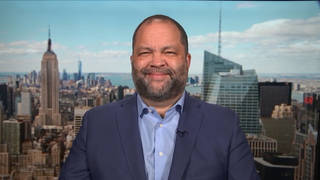
Hundreds of supporters of the imprisoned journalist Mumia Abu-Jamal gathered last week in Philadelphia to mark the 30th anniversary of his arrest for the killing of a white police officer. The event occurred just two days after Philadelphia prosecutors announced they will no longer seek the death penalty for Abu-Jamal. We ask NAACP president and CEO Ben Jealous to comment on the developments in his case. “The fact that Seth Williams felt, the DA in Philly felt, emboldened to come forward and to ask for something that was so reasonable and so just, in a city with such a conservative law enforcement history, really is testament to the fact that public support for the death penalty has fallen to an all-time low since it was reinstated, in the wake of Troy Davis’s execution,” Jealous says. [includes rush transcript]
Transcript
JUAN GONZALEZ: Ben Jealous, I’d like to ask you about another topic. Hundreds of supporters of the imprisoned journalist Mumia Abu-Jamal gathered last week in Philadelphia to mark the 30th anniversary of his arrest for the killing of a white police officer. The event occurred just two days after Philadelphia prosecutors announced that they will no longer seek the death penalty for Mumia. On Friday, Abu-Jamal, a former Black Panther, called in to the event to make his first public remarks since the prosecutor’s decision was announced. We’re going to play that clip.
MUMIA ABU-JAMAL: For the first time in almost 30 years, I’m not on death row physically. I’m in a new block called an AC block. The cells are somewhat identical to death row, but no one on this block is on death row, including myself. It takes some getting used to, you see. I’m still acclimating myself.
AMY GOODMAN: Ben Jealous, your reaction to the decision of the district attorney in Philadelphia?
BENJAMIN JEALOUS: Yeah, this is confirmation that the Troy Davis case is having an effect. The reality is that the court of public opinion is very closely tied to the court of law in these cases. And I think that the fact that Seth Williams felt, the DA in Philly felt, emboldened to come forward and to ask for something that was so reasonable and so just, in a city with such a conservative law enforcement history, really is testament to the fact that public support for the death penalty has fallen to an all-time low since it was reinstated, in the wake of Troy Davis’s execution.
AMY GOODMAN: And finally, this just coming out yesterday, North Carolina’s governor halting a Republican effort to dismantle a law that gives death row prisoners a new way to argue that racial bias influenced their sentences. Governor Beverly Perdue vetoed a bill that would have essentially repealed 2009’s Racial Justice Act. How significant is this, Ben?
BENJAMIN JEALOUS: You know, it’s very significant. All that that bill does is take the law back to what it was in the 1970s, when the death penalty was abolished nationally. What it says is that statistics of discrimination—this was the so-called Racial Justice Act—statistics of widespread racial discrimination can be used as proof in a court of law. We’ve been subject to the intent doctrine for decades now, this notion that racism can’t be proven to exist, unless you can prove what’s going on in an individual’s head, what their actual intent was. You know, and she did—the Governor did the right thing by standing up for common sense and saying, “Look, if we have a law that is being used almost exclusively against the poor and almost—you know, and hugely disproportionately against people of color, then we, as a state, through our court system, should be able to call it into question, and if we deem that it’s so racist that it’s not fixable, be able to strike that law down.”
AMY GOODMAN: Ben Jealous, we want to thank you for being with us, president and CEO of the NAACP, a co-author of the new report, “Defending Democracy: Confronting Modern Barriers to Voting Rights in America.”












Media Options